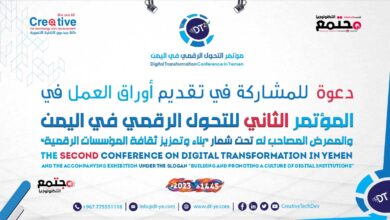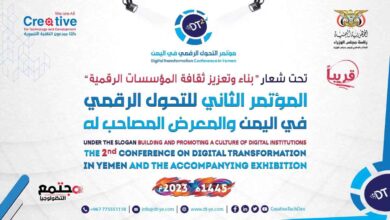
اختتام المؤتمر الثاني للتحول الرقمي في اليمن والمعرض المصاحب له2023
اختتام المؤتمر الثاني للتحول الرقمي في اليمن والمعرض المصاحب له
هاشم السريحي
اختتمت اليوم في صنعاء أعمال المؤتمر الثاني للتحول الرقمي في اليمن والمعرض المصاحب له والذي نظمته منظمة” كلنا مبدعون التقنية التنموية “بالشراكة مع “مركز مجتمع التكنولوجيا للتدريب والاستشارات” برعاية رسمية من دولة رئيس مجلس الوزراء و المكتب التنفيذي للرؤية الوطنية لبناء الدولة والبنك المركزي اليمني وبرعاية اعلامية من مجلة مجتمع التكنولوجيا.

ناقش المؤتمر الذي عقد تحت شعار “بناء وتعزيز ثقافة المؤسسات الرقمية” وعلى مدى ثلاثة أيام محاور تضمنت الاستراتيجية الوطنية للتحول الرقمي والشمول المالي والوعي المجتمعي في التحول الرقمي والشمول المالي لتحقيق التنمية المستدامة والبنية التحتية المرتبطة بالتحول الرقمي والخدمات المالية والاستثمار في مجال التحول الرقمي والشمول المالي والتشريعات والقوانين واللوائح المنظمة للخدمات الرقمية والذكاء الاصطناعي والتحول الرقمي.
وفي الاختتام كرم نائب رئيس الوزراء لشؤون الرؤية الوطنية محمود الجنيد ووزير الدولة لشؤون مجلسي النواب والشورى علي أبو حليقة الجهات الداعمة والمشاركة في المؤتمر والمعرض والشباب المبدعين والمبتكرين في المجال الرقمي.

وخرج المؤتمر بجملة من التوصيات
1. ضرورة تبني الدولة والحكومة للتحول الرقمي، والالتزام بذلك للنهوض بالواقع الرقمي للبلد في شتى المجالات.
2.إنشاء منصة لدراسة أفضل الممارسات والتجارب الناجحة في التحول الرقمي للاستفادة من الفرص والتحديات بمشاركة ودعم الجهات ذات العلاقة.
3. تنفيذ توصيات المؤتمر الأول للتحول الرقمي في اليمن لشمولها على النقاط الأساسية التي تمثل جوهر التحول الرقمي في اليمن.
توصيات المؤتمر الأول للتحول الرقمي في اليمن 2022
إعداد استراتيجية وطنية للشمول المالي والتحول الرقمي من الحكومة وبمشاركة القطاع الخاص ومنظمات المجتمع المدني في إطار زمني محدد وبمؤشرات أداء لمتابعة مستوى التنفيذ وبما يحقق أهداف التنمية المستدامة، وذلك من خلال:
أ. إنشاء لجنة وطنية لإعداد استراتيجية الشمول المالي والتحول الرقمي في اليمن من كافة الجهات ذات العلاقة.
ب. تبني الأجهزة الحكومية لعملية التحول الرقمي والشمول المالي ضمن رؤيتها وأهدافها الاستراتيجية.
ت. تفعيل العمل المشترك بين كافة الوزارات والهيئات المعنية لوضع الأسس ومراحل التحول بشكل متناغم ومتناسق.
ث. وضع أطر تنظيمية تحقق الاندماج بين تكنولوجيا المعلومات والاتصالات والقطاع المالي والمصرفي.
ج. إعداد رؤية تنظيمية للبنوك والمصارف لمساعدتها للتحول الرقمي والقدرة على المنافسة والاستمرار في سوق التكنولوجيا الرقمية.
ح. عمل تقييم دوري أو سنوي لقياس مدى التقدم في التحول الرقمي وفقاً لمؤشرات أداء.
2- إعداد التشريعات والقوانين واللوائح التي تنظم الخدمات الرقمية وخدمات الشمول المالي وفي ذلك يوصي المؤتمر بالتالي:
أ. سرعة إصدار قانون ينظم التجارة الالكتروني
ب. سرعة إصدار قانون مكافحة الجرائم الإلكترونية والذي تم رفعه لمجلس النواب للموافقة
ت. إعداد وإصدار التشريعات واللوائح السيبرانية والتي تضمن (حماية البيانات الشخصية – الحسابات البنكية – التعاملات الالكترونية)
ث. تكييف القانون اليمني الناظم للتجارة الالكترونية مع تشريعات الدول الأخرى التي تتبع النهج الرقمي في معاملاتها التجارية لإن البعد الدولي للتجارة الالكترونية يتطلب ذلك.
ج. تنظيم احكام حماية البيانات الشخصية لمستخدمي المعاملات الالكترونية سواء كانت تجارية او لا. بدون هذه الاحكام سيكون القانون اليمني غير متوافق مع قوانين الدول الأخرى الناهجة لنهج التحول الرقمي.
3- تطوير البنية التحتية لمختلف القطاعات المرتبطة بالخدمات الرقمية والشمول المالي، وذلك من خلال:
أ. الاهتمام بتطوير البنية التحتية لقطاع الاتصالات وتقنية وأمن المعلومات وفقاً لأحدث المواصفات العالمية وذلك من خلال:
1. انشاء وتخصيص البنية التحتية لمراكز البيانات المصممة لاستضافة الخوادم وأنظمة خدمات الشمول المالي بحيث تكون الاستضافة من قبل مراكز البيانات المحلية.
2. توفير الإنترنت عالي السرعة مثل الــ (4G,5G) ولكافة المستخدمين، وبأسعار معقولة.
3. التوسع والإنتشار في توصيل الألياف الضوئية لتغطي كافة مناطق اليمن.
4. توفير الوصول من خلال شبكات الـ internet (WAB).
ب. تقديم كافة الخدمات الرقمية الحديثة وتطوير المنتجات المالية التي تلبي احتياجات جميع الفئات.
ت. إختيار البيئة التشغيلية التكنولوجية المناسبة ووضع الأولوية في ان تكون هذه البيئة في إطار محلي للإستفادة من المميزات التي تمنحها الإستضافة السحابية المحلية.
4- رفع مستوى الوعي المجتمعي في التحول الرقمي والشمول المالي، من خلال:
أ. نشر الوعي والمعرفة بين أوساط المواطنين لتسهيل دخولهم سوق التكنولوجيا المالية.
ب. نشر التوعية بأهمية التحول الرقمي والامن السيبراني.
ت. العمل على اعتماد مناهج وبرامج متخصصة لتأهيل الكوادر في كافة مجالات التحول الرقمي والشمول المالي والأمن السيبراني،ممولة من القطاع الحكومي والخاص ومنظمات المجتمع المحلي والدولي.
ث. استهداف الجامعات والمعاهد المتخصصة بالبرامج التدريبية والتوعوية إبتداءً من التعليم العام وحتى التعليم الجامعي.
ج. إقامة منتديات واتحادات وائتلافات وطنية وإقليمية لتعزيز التحول الرقمي و تحقيق الشمول المالي.
ح. توعية مجالس الإدارات وبناء قدراتها ونشر المعرفة بأهمية تبني قضايا التحول الرقمي لضمان دعم عمليات التحول في الهيئات والمؤسسات والشركات.
خ. دعم الدراسات والأبحاث التي تتناول مواضيع الشمول المالي والتحول الرقمي.
د. بناء الثقة بين الوحدات المالية والمستفيد عبر عدة وسائل وأدوات عملية ومعرفية وحقوقية …إلخ.
5- تشجيع الاستثمار في مجال التحول الرقمي والشمول المالي من خلال الآتي:
أ. تبني سياسة الاستثمار في توسعة وتطوير قدرات البنى التحتية الرقمية.
ب. تحفيز دور الهيئات المتخصصة في عمليات التخطيط والحشد للاستثمارات المختلفة لبناء مجتمع المعرفة التكنولوجي.
ت. تشجيع وتسهيل المشاركة الفعالة للمستثمرين والشركات المحلية في الصناعة الرقمية وفي تطوير قطاع تكنولوجيا المعلومات.
ث. دعم الابتكارات في المنتجات المالية من خلال تحفيز الاستثمارات فيها.
ج. استقطاب خبرات متخصصة ومحترفة وزيادة التعاون والتنسيق مع المنظمات الخاصة والاقليمية والدولية.
ح. تعزيز دعم المشاريع الصغيرة والمتناهية الصغر وتمكينها من الاستفادة من التحول الرقمي والشمول المالي.
وشهد المؤتمر في ختام أعماله بحضور وكيل وزارة الصناعة والتجارة لقطاع خدمات الأعمال عبد الفتاح الذويد ومدير عام نظم المدفوعات في البنك المركزي اليمني يحيى الخطيب جلستين لمناقشة عدد من أوراق العمل، تناولت الجلسة الأولى برئاسة الدكتور عبدالباسط الضراسي، المحامي والمستشار القانوني، محور التشريعات والقوانين واللوائح المنظمة للخدمات الرقمية؛ متضمنة عدداً من أوراق العمل تناولت في مجملها أهمية التشريعات والقوانين في عملية التحول الرقمي، ودور الأطر التشريعية والتنظيمية في دعم ومواجهة الجرائم المعلوماتية الرقمية، وحماية حقوق الملكية الفكرية في البرامج والمحتوى الرقمي.
فيما ناقشت الجلسة الثانية برئاسة الدكتور شرف الكبسي، المدير العام لشركة Impact Consulting، محور الذكاء الاصطناعي والتحول الرقمي؛ متضمنة عدداً من أوراق العمل تناولت في مجملها مفهوم الذكاء الاصطناعي ومتطلباته وتطبيقاته، وأهمية استخدام التقنيات والحلول الرقمية المبتكرة في تحسين عمليات الانتاج وزيادة كفاءة الموارد، كما تطرقت إلى أهمية الاستفادة من الذكاء الاصطناعي في تجويد الخدمات المقدمة للعملاء.
وفي الاختتام عبرت المدير التنفيذي لمنظمة كلنا مبدعون التقنية التنموية المهندسة وفاء العريقي عن شكرها لكل من ساهم في إنجاح فعاليات المؤتمر، من منظمين وداعمين ومعدي أوراق العمل.
وأكدت أهمية العمل على تنفيذ توصيات المؤتمر الثاني بما من شأنه الوصول إلى التحول تدريجياً نحو اقتصاد وطني رقمي قوي.
وكرمة منظمة كلنا مبدعون التقنية التنموية بحضور الاستاذ محمود الجنيد نائب رئیس الوزراء لشؤون الرؤية الوطنية رئيس المكتب التنفيذي لإدارة الرؤية الوطنية الذي قام بتكريم جميع الجهات الرسمية والخاصة الراعي والمشاركة في المؤتمر والمعرض بالدروع على مشاركتهم الفاعلة في انجاح هذا المؤتمر والمعرض.









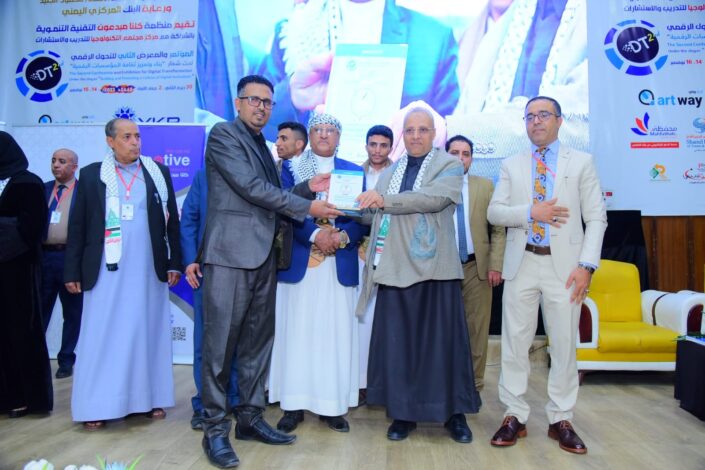
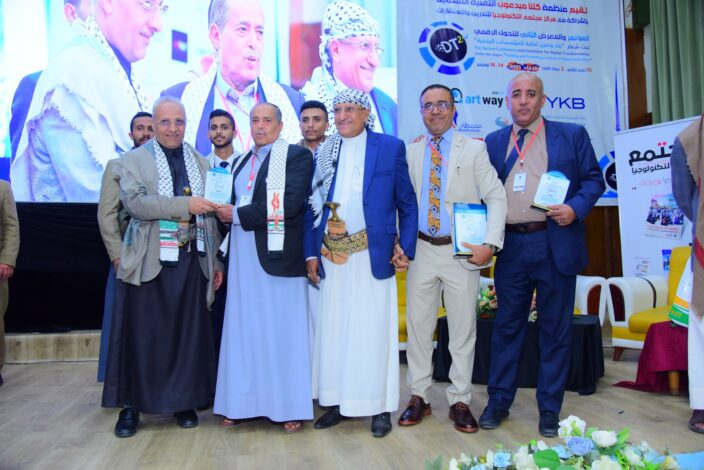


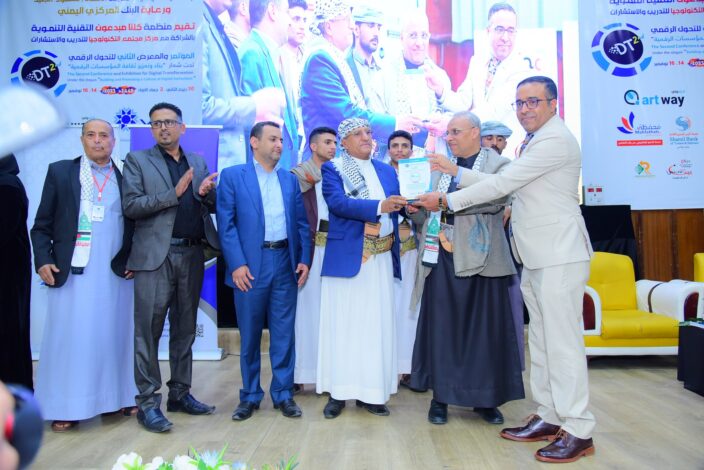


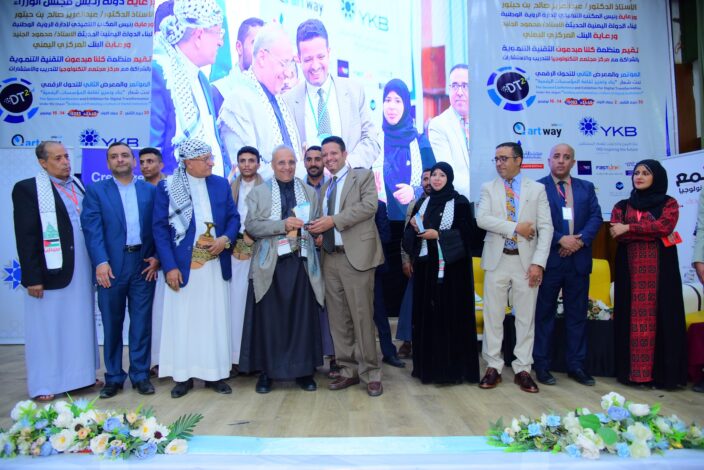


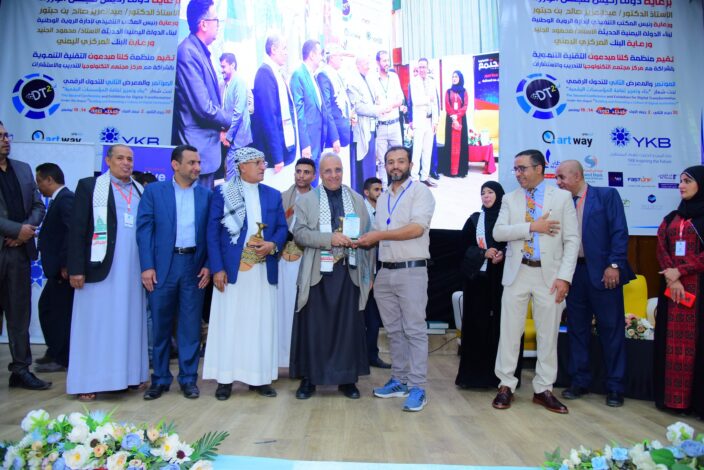


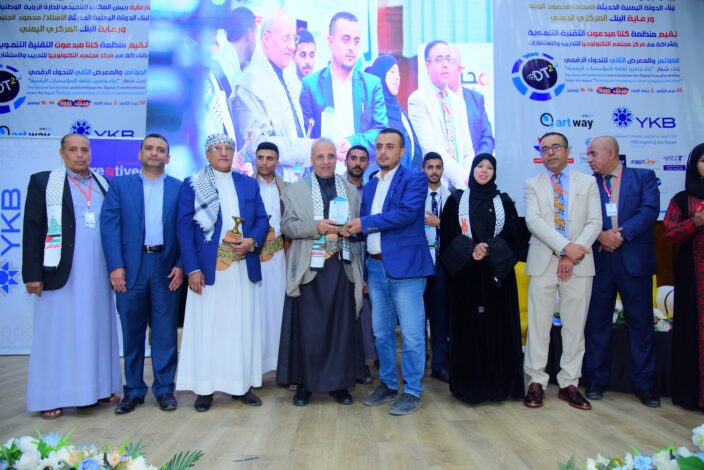





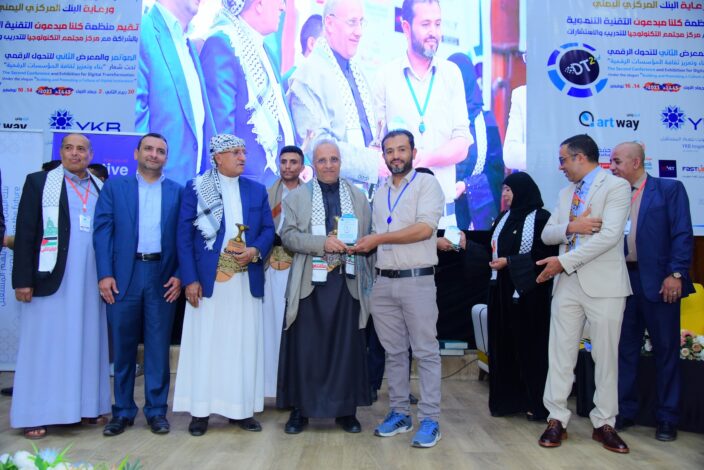
The Conclusion Of The Second Conference On Digital Transformation In Yemen And Its Accompanying Exhibition 2023
The second conference on digital transformation in Yemen and the accompanying exhibition, organized by the “We are all creative development technology” organization in partnership with the “Technology Community Center for Training and Consulting”, concluded today in Sana’a under the official patronage of His Excellency the Prime Minister, the Executive Office of the National Vision for State Building and the Central Bank of Yemen and under the media sponsorship of the Technology Society Magazine.
The conference, which was held under the slogan “Building and Strengthening the Culture of Digital Institutions” over a period of three days, discussed axes that included the national strategy for digital transformation, financial inclusion, community awareness in digital transformation, financial inclusion to achieve sustainable development, infrastructure related to digital transformation, financial services, investment in the field of digital transformation, financial inclusion, legislation, laws and regulations governing digital services, artificial intelligence and digital transformation.
At the conclusion, Deputy Prime Minister for National Vision Affairs Mahmoud Al-Junaid and Minister of State for Parliamentary and Shura Council Affairs Ali Abu Haliqa honored the supporting parties and participants in the conference and exhibition, and creative and innovative youth in the digital field.
The conference came out with a number of recommendations
1. The need for the state and the government to adopt digital transformation, and to commit to this to advance the digital reality of the country in various fields.
2. Create a platform to study best practices and successful experiences in digital transformation to take advantage of opportunities and challenges with the participation and support of relevant authorities.
3. Implement the recommendations of the first conference on digital transformation in Yemen to include the basic points that represent the essence of digital transformation in Yemen.
Recommendations of the First Conference on Digital Transformation in Yemen 2022
1. Preparing a national strategy for financial inclusion and digital transformation from the government with the participation of the private sector and civil society organizations within a specific time frame and with performance indicators to follow up the level of implementation and achieve sustainable development goals, through
a. Establishing a national committee to prepare a strategy for financial inclusion and digital transformation in Yemen from all relevant authorities.
b. Government agencies adopt the process of digital transformation and financial inclusion within their vision and strategic objectives.
c. Activating joint work between all ministries and concerned bodies to lay the foundations and stages of transformation in a harmonious and harmonious manner.
d. Develop regulatory frameworks that integrate ICTs with the financial and banking sector.
e. Preparing a regulatory vision for banks to help them for digital transformation, competitiveness and continuity in the digital technology market.
f. Going to. Conducting periodic or annual evaluation to measure the progress of digital transformation according to performance indicators.
2- Preparing legislation, laws and regulations governing digital services and financial inclusion services, and in this regard, the Conference recommends the following
a. Speedy issuance of a law regulating e-commerce
b. The speed of issuing the Anti-Cybercrime Law, which was submitted to the House of Representatives for approval
c. Preparing and issuing cyber legislation and regulations that ensure (protection of personal data – bank accounts – electronic transactions)
d. Adapting the Yemeni law regulating e-commerce with the legislation of other countries that follow the digital approach in their commercial transactions because the international dimension of electronic commerce requires it.
e. Regulating the provisions of protecting the personal data of users of electronic transactions, whether commercial or not. Without these provisions, Yemeni law would be incompatible with the laws of other countries pursuing a digital transformation approach.
3- Developing the infrastructure of various sectors related to digital services and financial inclusion, through:
a. Attention to developing the infrastructure of the ICT sector in accordance with the latest international standards through:
1. Establishing and allocating data center infrastructure designed to host servers and financial inclusion service systems so that hosting by local data centers.
2. Providing high-speed Internet such as (4G,5G) for all users, at reasonable prices.
3. Expansion and spread in the delivery of optical fibers to cover all regions of Yemen.
4. Provide access through Internet networks (WAB).
b. Providing all modern digital services and developing financial products that meet the needs of all groups.
c. Choosing the appropriate technological operational environment and prioritizing this environment to be in a local framework to take advantage of the advantages offered by local cloud hosting.
4- Raising community awareness in digital transformation and financial inclusion, through:
a. Spreading awareness and knowledge among citizens to facilitate their entry into the financial technology market.
b. Spreading awareness of the importance of digital transformation and cybersecurity.
c. Work on adopting specialized curricula and programs to qualify cadres in all areas of digital transformation, financial inclusion and cybersecurity, funded by the government and private sectors and local and international community organizations.
d. Targeting universities and institutes specialized in training and awareness programs starting from general education to university education.
e. Establishing national and regional forums, federations and coalitions to promote digital transformation and achieve financial inclusion.
f. Going to. Raising awareness of boards of directors, building their capacities and spreading knowledge of the importance of adopting digital transformation issues to ensure support for transformation processes in bodies, institutions and companies.
h. Supporting studies and research on the topics of financial inclusion and digital transformation.
i. Building trust between financial units and the beneficiary through several means and practical, knowledge and human rights tools … Etcetera.
5- Encouraging investment in the field of digital transformation and financial inclusion through the following:
a. Adopting an investment policy in expanding and developing the capabilities of digital infrastructures.
b. Stimulating the role of specialized bodies in the planning and mobilization of various investments to build a technological knowledge society.
c. Encourage and facilitate the active participation of local investors and companies in the digital industry and in the development of the information technology sector.
d. Supporting innovations in financial products by stimulating investments in them.
e. Attracting specialized and professional expertise and increasing cooperation and coordination with private, regional and international organizations.
f. Going to. Enhancing support for small and micro enterprises and enabling them to benefit from digital transformation and financial inclusion.
At the end of its work, in the presence of the Undersecretary of the Ministry of Industry and Trade for the Business Services Sector, Abdul Fattah Al-Thawayed, and the Director General of Payment Systems at the Central Bank of Yemen, Yahya Al-Khatib, witnessed two sessions to discuss a number of working papers, the first session, chaired by Dr. Abdul Basit Al-Darrasi, lawyer and legal advisor, dealt with the axis of legislation, laws and regulations governing digital services, including a number of working papers that dealt in their entirety with the importance of legislation and laws in the process of digital transformation, and the role of legislative and regulatory frameworks in supporting and confronting information crimes. digital, and the protection of intellectual property rights in software and digital content.
T The second session, chaired by Dr. Sharaf Al-Kibsi, General Manager of Impact Consulting, discussed the axis of artificial intelligence and digital transformation, including a number of working papers that dealt with the concept of artificial intelligence, its requirements and applications, and the importance of using innovative digital technologies and solutions in improving production processes and increasing resource efficiency, as well as the importance of benefiting from artificial intelligence in improving the services provided to customers.
In conclusion, the Executive Director of the Organization We are all creative development technology, Eng. Wafaa Al-Ariqi, expressed her thanks to all those who contributed to the success of the conference’s activities, including organizers, supporters and authors of working papers.
She stressed the importance of working to implement the recommendations of the second conference in order to reach a gradual transition towards a strong digital national economy.
We are all creative development technology organization was honored in the presence of Mr. Mahmoud Al-Junaid, Deputy Prime Minister for National Vision Affairs and Head of the Executive Office of the National Vision Department, who honored all official and private sponsors and participation in the conference and exhibition with shields for their active participation in the success of this conference and exhibition.




